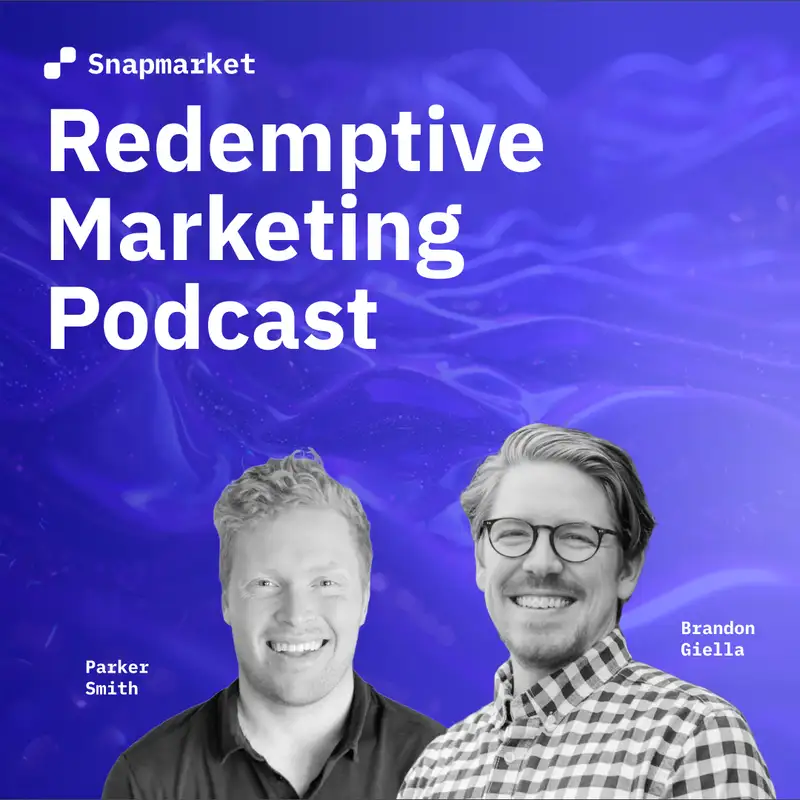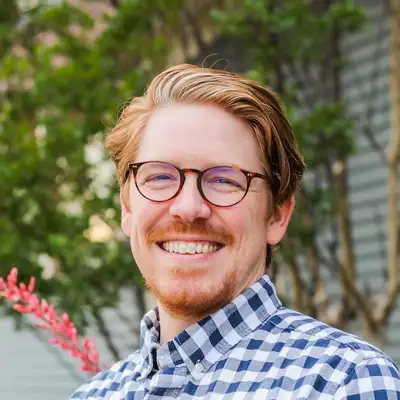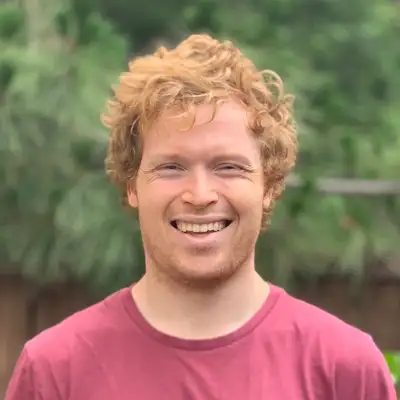020: Oxford, Cape Town, and back again
Snap market.
Brandon Giella: Hey, Parker.
We're back.
Parker Smith: Hey, Brandon.
We're back.
You know, we've just been, uh, in the
internet for months, not doing anything
at all, and now we're just, uh, poking
through to the real world again.
You know, we've just been floating around.
Brandon Giella: We have been
floating around in real life,
actually all around the world.
We went to four continents in two weeks.
Including North America.
I guess that's a given, but, but
we went to Europe, went to England,
and then we went to Asia where we
stopped over in Istanbul, which
by the way is an amazing airport.
If you have the chance to go
to Istanbul, go to the airport.
Uh, and then we went to Africa to visit
our team in Cape Town, South Africa, which
was really great and highly rewarding.
Parker Smith: yeah.
Yeah.
So it was, it was, uh, at least
30 hours of flight each way.
Um, it was by far the
longest I've traveled, but.
Um, it was amazing that you could
just hop on a plane and be somewhere
over a weekend, like across the world.
Brandon Giella: and lose your bags.
You lost your luggage, which
Parker Smith: true.
Um, to be fair, it wasn't
lost, it was just delayed.
It was on a, on the
previous flight to Heathrow.
Um, and I got notified and then
they couriered it to me in Oxford.
So
Brandon Giella: Pretty
Parker Smith: as losing your bag goes, it
was actually kind of best case scenario.
Brandon Giella: Yeah.
Yeah.
Praise.
Uh, what, what, what airline was it?
Give him a shout out.
Parker Smith: Uh, must've been American,
Brandon Giella: Yeah.
Nice.
Great job, American.
Parker Smith: Yeah.
Then we flew to Turkish Airlines
the rest of the way, but the, uh,
best airplane food I've ever had.
Brandon Giella: It was
actually a great airline.
I've never flown on it before.
Parker Smith: Yeah.
Brandon Giella: Um, so we went to
the Skoll World Forum in Oxford,
which is essentially the, one of the
foremost gatherings annually for social
impact leaders, if I could say that.
So whether nonprofit or for-profit
people trying to eradicate poverty
and address climate change and,
build sustainable homes and.
Supply chains and things like
that all around the world.
And, uh, it was very, very cool.
We sat in on some sessions.
Uh, we went to the sidebar, which
is like a, like a free open kind
of conference that that parallels
Parker Smith: the Conference.
Yeah.
Brandon Giella: Around the conference.
And, you gave a, talk at one of
the sidebar events on ethical ai.
Or rather you facilitated a
conversation, which, some of the
leaders in there were pretty astute and
savvy and interesting, and I thought
it was such a cool conversation.
Parker Smith: yeah, They're really
sharp and coming at it from a.
a different angle than I guess us as
practitioners at this point of ai,
leveraging it day to day and using
it and wrestling with real world,
ethics of it.
Um, the idea and the question for the,
the talk was around, um, AI governance.
Um, so it was, it was, it was really cool.
We, uh, um, there was, uh.
Jim Erman, the CEO of Tech Matters,
Michelle Baldwin, um, with the Wassan
Network, uh, and then Vinay Naer of Ful.
So these guys are integrators
at, um, at the macro level.
So, um, big enterprise or, or government
level conversations around ai,
Brandon Giella: or academia.
One.
One.
Uh, I think Michelle was a professor.
Yeah.
Parker Smith: Right.
Yeah.
Um, and so they had great insights to
contribute and so we kicked off the
conversation just asking like, what are
the ethical problems people are seeing?
Um, and a lot of it had to do
with, um, data privacy, uh, which
actually isn't an AI function.
It's a, it's like a work around,
it's an internet function.
Uh, but it's, it's another, uh, you
know, black box that people are.
Dumping loads of data into, and, um,
and then there's like a competitiveness,
you know, um, uh, aspect of like,
you know, is it creating jobs?
Is it taking jobs, is it,
um, doing that sort of thing.
Um, and, um, some, uh, we're actually, um.
Doctoral students or, or
researchers at Oxford, um,
talking about like algorithmic ai.
So like, um, the algorithms in social
media feeds have been using AI, quote
unquote for years beyond even what
open AI introduced a couple years ago.
Um, and so, uh, there's a lot of
conversation around the ethics
of that type of algorithmic, um,
intelligence quote, quote unquote, um.
And so it was a really good conversation.
Um, and it was, it was like there was
a panel, but then we opened up the,
floor for questions and conversations
between, uh, it was a group of about
20 people, but, um, really influential.
Yeah.
Brandon Giella: Yeah.
Yeah.
I thought it was really helpful to
see, it's the, it's one of those
conversations like the state of
the art, hearing what people are
believing and thinking and trying to
work out in real time on the ground.
So I thought it was really, cool.
Yeah.
Parker Smith: Yeah.
And just a brief recap of I guess
our ethic around AI is, and this is
kinda what, I presented there was, I.
The idea of human, robot, human.
So making sure that it's,
there's a human in the loop, I
guess is another way to say it.
so organic first input, distilling that
down versus blowing it up, distilling
it down and processing, automating
as much as you can with your robots.
And then human oversight, quality
control, and packaging for use.
so that's kinda our core.
Philosophy there, as well as
obviously the being mindful of
the, data privacy component.
Brandon Giella: Mm-hmm.
Parker Smith: So there's a lot
more to say along those lines.
But overall the, our experience was, um,
not just that talk, but we, we also had, a
great day with the Praxis crew, in the uk.
they had just come off their.
event and, facilitated a, like a prayer
walk around Christchurch Meadows.
and, a brunch, networking
brunch that we were a part of.
So we met, some new friends and,
I heard of really phenomenal
initiatives going on around the world.
There's a lot of, a lot of focus
on Africa at the moment, both, both
as a need and as an opportunity.
I think,
in terms of investment, it's one of
the greatest, there's, a lot of in
infrastructure to be built, there's a lot
of, burgeoning economies that are ready
to, become the next tech or, industrial.
Powerhouse and that sort of thing.
And so there was a lot of conversation
around USAID and the effect of that,
a lot of conversation around private
investment and faith-driven initiatives.
Um, there was, there was a
lot going on and we were just
kind of flies on the wall so.
Brandon Giella: Yeah.
One of, one of the fun stats is, uh, I,
I believe is, this is what I'm saying
is accurate, is that Africa is the
only continent that has, uh, a growing
population or like a rising demographic.
And so there was this chart that I saw one
time at this, uh, investor event where all
the other major economies and, and regions
of the world, they're, um, they're like.
Replacement rate.
I think it's the, the
birth to death ratio.
The replacement rate is declining
in that their populations are aging.
But if you look at the 18 to 35
demographic segment for Africa,
it's like through the roof.
It's like, especially for.
For men.
And so anyway, the, the big
argument is that Africa is just
growing at this astonishing rate.
Like they're economically,
demographically, um, you know,
technologically like Nigeria and other
places around Africa are just having this
like boom and, and tech investment and
entrepreneurship and things like that.
So it's just like.
I dunno.
It was just, it changed my view
of, of Africa in a lot of ways.
So it was really neat.
And then going to Africa and South Africa,
which is, you know, kind of distinct
from a lot of the other parts of Africa.
But, um, it was just really neat.
I don't know, it was just, just gave me
a new perspective that was really useful.
And then the praxis, vision and
the kind of things that they talk
about I think is just phenomenal.
It's it's one of the best frameworks
for thinking about entrepreneurship,
business building, venture
building, that kind of thing.
It's just really cool.
Parker Smith: Yeah.
And so I, on our transition to
South Africa meeting with our team,
that's, that's where we kicked it
off was with the redemptive frame.
Brandon Giella: Mm-hmm.
Parker Smith: we, we jumped into kinda
the exploitative ethical redemptive
paradigms, the how, the why, the what,
um, in terms of operations and leadership.
Um, tell us a little bit about our
journey to South Africa, Brandon.
Brandon Giella: Yeah, so we flew through
Istanbul, landed in South Africa, and then
the first day of our co-working experience
where we rented a a boardroom, we,
yeah, went through the redemptive frame.
We talked the next day
about our messaging.
So we talked through like
the, you know, ideal clients.
We talked about the process through
which we are creating our work, and, um.
And, and I think it was really helpful
for the team to see everything, like
even visually, like on a whiteboard and
talking through each step of the process
or each component of the business.
Um, and then we went to Table
Mountain, which was really cool.
Highly recommend folks.
Go climb Table Mountain.
If you're in Cape Town.
Uh, we went to wineries.
Wow.
And like really nice hotels.
There's like this super nice hotel golf
course winery situation in the Western
Cape that I was kind of blown away by.
I didn't expect, but it was
so beautiful and so nice.
Uh, and then, um, yeah, we
just had a really great time.
Got a, got a lot of work done
and, um, started building like our
website and, and, uh, a social media
library that I'm excited to roll out
and some other features, um, that
we'll talk about in later episodes.
But it was cool.
Parker Smith: and we can't
overlook the team Bri that we
had when we first got there.
Um, I.
So a bride, a South African
barbecue on, on an open flame.
Um, and so we're at, uh, one of our
team members' homes at Overlooking
beautiful hot and taught mountain range.
Um, and, uh, yeah, had everybody there,
um, meeting most of the team for the,
in the person for the first time.
And I, in a culture that's
very remote work, remote,
type relationships
online with team members.
I can't understate, I can't
overstate enough how significant
it is to spend time together,
with a team that's, remote.
So I think I, part of the value just
was being present apart from, the
projects that we were running that week.
So
Brandon Giella: Yeah, I, think it.
A big takeaway for me was seeing the lives
and the stories of the people that we've
been working with together every day,
like meeting their spouses, seeing their
kids, taking their kids to, school, and
seeing this new school that they're able
to go to because of Snapmarket Market.
And just thinking about.
How Parker, you and I had this idea
that we were texting about one night
of Snapmarket and then, 18 months
later we're able to see that idea
impact kids and where they go to
school and other folks and, quitting
their jobs and working with us and the
impact that's had on their families.
And, the, just generally just
like the stories of what.
You can do in the world as a person
and the weight and responsibility of
feeling like taking care of people,
you know, of clients, of our team,
of our families, and like, it just
felt really real and like raw for me.
Like seeing this whole group
of people and like every, just
seeing like this whole stakeholder
group that we are caring for and.
It just felt really real.
But it was like, but it's a mix of like
the stories with that, because we talked
about like Tolkien and philosophy, we
like argued about like the doctrine of
scripture and you know, like we just
were so, it was so rich with story and
meaning, literature, philosophy, theology,
and then relationships and people and,
and just seeing like how much this.
Little idea has turned into
something in the world.
It's just like, and, and, but I
just feel like this weight, you
know, like this responsibility,
but like also excitement and hope.
So it's, I don't, it's, I don't know, it
just gave me a lot of feels over the week,
so yeah, it was really, really meaningful.
Parker Smith: Yeah.
And then even just engaging
with the complexities of
posta, apartheid South Africa
Brandon Giella: Yeah.
Parker Smith: and, and, and,
being immersed in a culture
very different from our own, yet
very similar in a lot of ways.
Um, I kept, when FaceTiming the kids back
at home, I just kept saying, guys, the
world is really big, and whatever you're
imagining, it's way bigger than that.
Brandon Giella: Mm-hmm.
Parker Smith: And so I think.
I think.
you know, sometimes it's good to just
feel small, like you're a piece in, in
nature, you know, like when you go to
the mountains and not just the mountains,
but the mountains on the other side of
the world, and you, know, behold the,
the beauty of, you know, uh, Rohan,
you know, it's very similar,
uh, topography to New
Zealand in some ways, but,
Brandon Giella: but to think,
yeah, that we are just a few
hundred miles from Antarctica.
That's so weird.
You know, like, that's such a bizarre,
like my, my directional senses were so off
more often than they, they already are.
Parker Smith: Yeah,
after flying back, uh, through Istanbul
sleeping on the IGA floor lounge,
which I highly recommend, IGA lounges.
Thanks Brandon for the hookup.
Brandon Giella: That was great.
Parker Smith: fun.
Um, I.
We, we flew our 30 hours and, and
made our way back, uh, just in
time for an economic downturn.
And, uh, we're ready to, ready to roll?
Brandon Giella: Yeah.
Yeah, yeah.
See how the Dow Jones I
just read this morning is.
Having the worst period since
the Great Depression, and it's
like, all right, time to work.
Let's get after it.
Parker Smith: Yeah.
Yeah, well, let's get after it.
Brandon Giella: let's do it.
Parker Smith: we're, we're
ready to, we're ready to roll.
We have, we have a ton of momentum
from our time together with the
team, um, adding new features
to our app, uh, repackaging our
website, uh, really focusing our,
our own marketing and messaging
we're, which we're really proud of.
excited to share that with the world.
So stay tuned.
Uh, thanks for listening in,
and we'll talk to you soon.
Brandon Giella: I see you.


